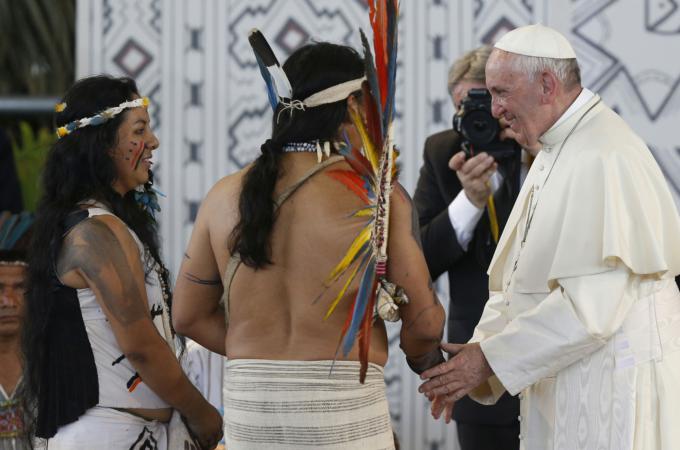Synod of the Amazon and married priests
The news that Pope Francis has set in motion the planning for a synod of bishops of the Amazon region next year may not strike most U.S. Catholics as a matter of great interest. But hold on--there's a lot more at stake here than may appear at first glance. For if the bishops of the vast (2.1 million square miles), priest-short Amazon region ask for married priests and the Pope approves--and both of those things seem likely to happen--the synod will have taken a large step toward married priests in many areas besides the Amazon..
If so, it won't mark the end of priestly celibacy. But it will have set the Church on a path of radical change in ways that lie far beyond anybody's ability to predict now.
The idea of ordaining viri probati (mature, trustworthy men) to celebrate Mass and provide other sacramental services in places where celibate priests are in short supply goes back at least to the time of the Second Vatican Council but only lately has come to life again. If the experiment in the Amazon--supposing it's approved--succeeds in meeting the need there, it is likely to be repeated by bishops in other places with the same problem.
That includes not only remote regions like the Amazon but areas such as parts of Western Europe where ordinations of new priests have slowed to a trickle. Quebec's bishops are said to be looking at the idea, and there could be interest elsewhere.
The regional synod for the Amazon will take place at the Vatican in October next year. The planning group established by Pope Francis includes prominent advocates of ordaining married men such as Cardinal Claudio Hummes, a Brazilian who formerly headed the Vatican's Congregation for the Clergy and who spoke well of the viri probati proposal before coming to Rome.
Married priests already are present in the Eastern churches, and married clergy from some other Christian churches--notably, former Anglicans--have for some time been allowed to receive ordination and serve as priests in the Western Church.
But priestly celibacy has a long and honored place in the Church dating back centuries--indeed, to apostolic times. Vatican Council II, in its Decree on the Ministry and Life of Priests, finds its basis in Jesus' words in Matthew 19.12, where he praises those who forgo marriage "for the sake of the kingdom of heaven." In a cultural context like ours, in which many people take it for granted that celibacy is impossible, Vatican II urges priests to pray for "the grace of fidelity, which is never denied to those who ask" (Presyterorum Ordinis, 16).
The priest shortage is a serious problem wherever it exists, and there are places in the U.S. where the crunch is felt. But how realistic is it to imagine that a radical solution like ordaining married men could be limited to just the areas of acute need? The impact this would have on the acceptance and practice of priestly celibacy everywhere requires serious consideration before moving ahead anywhere.
The Church already has some married priests, but a move toward universal institutionalization of what would be a de facto two-tier structure for priesthood, with some celibate priests and some married, should be weighed carefully for its likely consequences before taking any irreversible action. And it's fair to ask if a handful of bishops from a remote region, engaged in a laudable effort to solve their special problems, are best situated to do that.
- Russell Shaw is the author of more than twenty books. He is a consultor of the Pontifical Council for Social Communications and served as communications director for the U.S. Bishops.



















